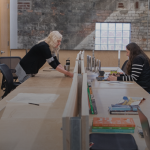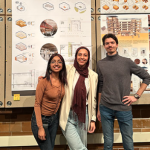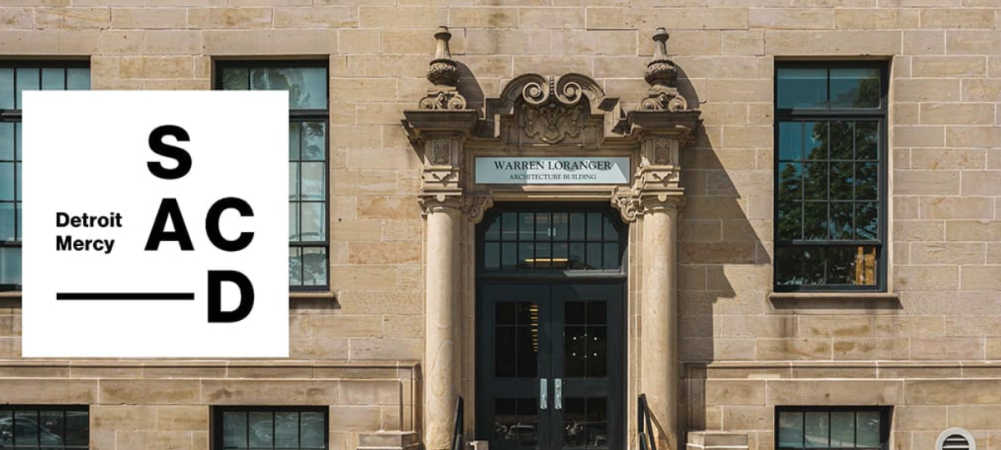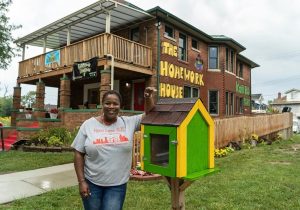The University of Detroit Mercy School of Architecture and Community Development is no stranger to receiving awards, but a rather large feather in its cap came five months ago.
At the end of the 2023 school year, three students were among the elite winners of the American Institute of Architects Committee on the Environment (AIA COTE) award.
The coveted award, now in its 28th year, was founded on the idea that sustainability is essential to design excellence and vice versa. The COTE® Top Ten has become the industry’s best-known award program recognizing innovative projects integrating exemplary performance with compelling design. More than 1,100 projects were submitted for the competition.
The Dean of the University of Detroit Mercy School of Architecture and Community Development (SACD) Dan Pitera could not be prouder of the students and faculty, and he points to the “threads” that run through the school’s curriculum as one of the stepping stones on the student team’s journey to achieving the award.
“The most effective way to teach is not one class or class by class, it is by weaving threads throughout the content of the entire curriculum so the student constantly picks up on sustainability concepts as an integral part of all areas of design,” said Pitera.

STUDENTS AT WORK
The school is internationally recognized for its social, economic, environmental, and justice-driven approach – the ‘threads’ that Pitera speaks of.
A great example of this is the school’s Codes and Zoning course. Here, in addition to the traditional information taught, students also learn about redlining, deed restrictions, and blockbusting. “This is not what most people teach in a codes and zoning class, but it’s critically important for the students to understand these real-world scenarios and how they impact or have impacted communities in which they will work,” he says.
The COTE Award-winning project came out of a class every architectural student at the school must take in their fourth year. In the class, students must take these threads – the sustainable components of design – and design a comprehensive building that deals with sustainable issues.
Students Marcus Puste, Farah Ossaimee, and Dolin Diaz developed Timber Integrative Means + Biophilic Resilience (TIMBR), a proposal for a 100,000-square-foot mixed-use building in Detroit’s Rivertown District. Timber construction products were used in both the interior and exterior of the five-story building to achieve net zero emissions.
“The project pushed us to design something livable and sustainable,” said Puste. “We also used materials that allow the building to be reused beyond its lifespan, designing for now and the future.”

COTE AWARD WINNERS
Puste also points to the “threads” coming together for him when working on the project. “Regardless of the topic, sustainability is embedded as a priority,” he said. “And the TIMBR project allowed us to get into the nitty gritty – the practicality of using what we’ve learned and the tools we have to achieve sustainable design.”
Puste also commends the collaboration and teachings of faculty members who work as architects at the Detroit Collaborative Design Center as being an integral part of his learning experiences.
The Detroit Collaborative Design Center will celebrate its 30th year in the academic year of 2024-2025. Pitera served as its executive director for most of those years and thus developed much of the model and the curriculum.
“The DCDC is a true architecture office within a school,” says Pitera. “Here you have full-time architects, urban designers, and landscape architects working alongside the students. It is what a teaching hospital is to a medical school. It’s essential to take theory and practice and bring it together, and the DCDC does this.”
Pitera is no stranger to awards either. He was AIA Detroit’s 2023 Gold Medal Award recipient – the prestigious organization’s highest honor that recognizes distinguished service to the theory and practice of architecture or to the local chapter of the American Institute of Architects.
In the end, he says the most important thing he and the faculty and school can do for the students is to prepare them to be able to change and adapt.
“Things change so quickly,” he said. “At the beginning of the 2023 school year, I asked students if they thought AI was going to be a dominant component in their work, and they laughed. One year later when asked what tools we will be using as architects going forward, all of the students said AI.”
Pitera says faculty members will unexpectedly change things up mid-project and force students to adapt so that they come out of the program with that experience.
“Again, we want students to be able to face real-world scenarios and excel throughout their careers – and keep them sustainable in those careers.”
As always, be sure to subscribe to our newsletter for regular updates on all things Detroit.























